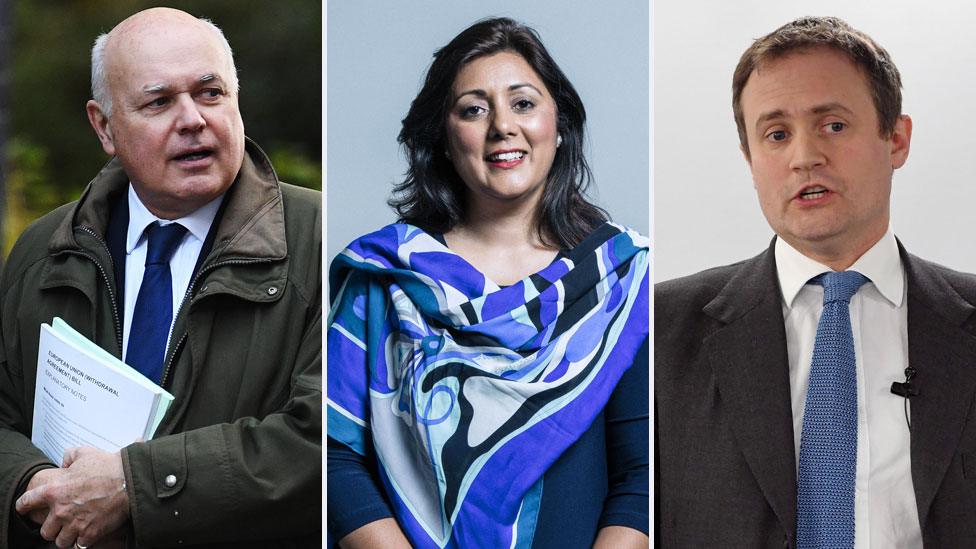Why did MI5 name Christine Lee as an 'agent of influence'?
- Published
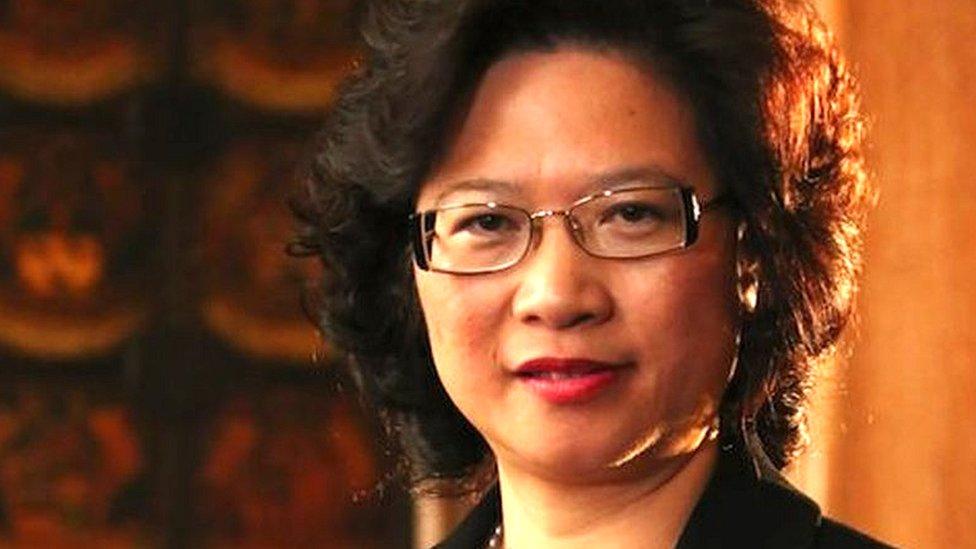
Christine Lee
British security services issued an alert earlier this year stating that a UK-based lawyer had been engaged in "political interference activities" for the Chinese state. MI5's public naming of Christine Lee, and a recent unprecedented news conference with the FBI, mark a shift in the approach being taken against the security threat posed by China.
It is not normally good news when an MP is summoned to the office of parliament's director of security. It is worse when officers from MI5 are waiting. That was Labour MP Barry Gardiner's fate on the morning of 13 January.
He was told the meeting was about Christine Lee - a woman he had long considered a close friend. She had donated about half a million pounds to support his work and her son worked in his office. The Speaker of the House of Commons was moments away from issuing an alert.
Gardiner's friend was about to be accused not of being a spy but something more hazy - an agent of influence carrying out "political interference activities on behalf of the Chinese Communist Party".
Lee's friendship with Gardiner had been crucial in smoothing her path into Westminster, where her contacts eventually spread across the political spectrum and to the highest levels. She had met Theresa May and David Cameron and donated to the local party of Ed Davey MP, when the Liberal Democrat leader was secretary of state for energy.
The events that led to 13 January throw a spotlight not just on one woman's path into the highest political circles, but also the changing relationship between the UK and China - and a growing alarm from security officials. At the start of July, the heads of the UK's MI5 and America's FBI made an unprecedented joint appearance in London to publicly warn of the threat from China.
The 13 January conversation was not the first between security officials and Barry Gardiner. Lee's donations had first been highlighted in the media five years earlier. So why was there suddenly a need for such a public alert?
MI5 had gradually received new information suggesting money was flowing into the UK political system with its true origins in China hidden. Specifically, they believed it was linked to the United Front Works Department (UFWD). The UFWD has been referred to by the Chinese Communist Party as a "magic weapon" - not a secret intelligence agency so much as an influence agency. It is one of the organisations that the head of MI5, Ken McCallum, named in his 6 July speech as "mounting patient, well-funded, deceptive campaigns to buy and exert influence".
Even though Gardiner would draw most media attention in the alert's wake - earning him the moniker "Beijing Barry" - the concern for MI5 was not primarily about Christine Lee's links to him. Rather, it was an assessment that China was trying to progress a new generation of political candidates.

Labour MP Barry Gardiner
Christine Lee was involved in a "seeding operation", multiple officials claim, reflecting the way the Chinese state operates - a willingness to wait years for efforts to pay off. Without naming individuals, security sources say there were a handful of candidates across all major parties.
In remarks to journalists after his 6 July speech, the head of MI5 also emphasised this danger:
"It's not always the case of seeking to influence a national leader or someone at cabinet level. One of the things that is very striking is that they are prepared to invest in cultivating people at local level potentially and at the outset of their political career."
US intelligence officials have also warned that local officials are increasingly targeted by China.
By late 2021 this danger - in the case of Christine Lee - was assessed as serious enough that it needed to be disrupted. But how?
"The government and the intelligence agencies have the intelligence tools to identify some of the activities going on," says Lord Evans, a former MI5 head who now chairs the Committee on Standards in Public Life. "But the question is, if you identify those activities, what can you then do about it?"
Over months, officials looked to see if there was enough evidence to prosecute Lee for any crime. But they drew a blank.
That left an alert, publicly naming her as agent of influence.
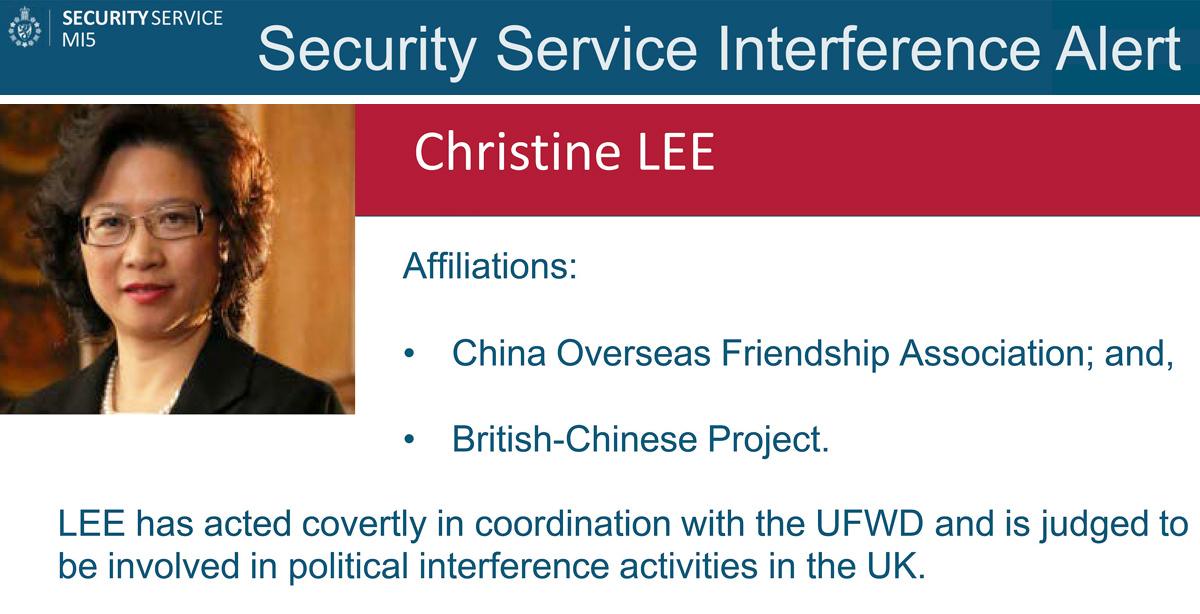
Excerpt from the MI5 alert about Christine Lee
It was only the second of its kind to be issued. The previous summer, a Pole and a Ukrainian had contacted about 100 MPs by email ostensibly to talk about the far-right in Ukraine but really to push policies helpful to Moscow. An alert to warn about their activities received almost no publicity but did lead to dozens of MPs getting in touch with parliamentary security officials for advice.
The alert about Christine Lee would be far more high-profile because her UK roots were much deeper and her role was anything but secret.
Christine Lee arrived from China in 1974 aged 11. She says she experienced verbal bullying at her school in Belfast as the only Chinese person in her class.
She founded her own law firm in 1990 and, from a cramped office in north London, specialised in immigration issues including asylum claims and work visas linked to China. This brought her into contact with the Chinese Embassy, leading to her becoming its legal adviser in 2008. She later became a legal adviser to the Overseas Chinese Affairs Office in Beijing which in 2018 became part of the United Front Works Department. She served on other groups promoting contacts between China and overseas Chinese communities.
Lee, who has not commented publicly, did not respond to requests to speak to the BBC.
In the wake of the alert in January, Barry Gardiner said he had "spoken openly and frankly" with the security services "for a number of years" about his contact with Christine Lee and that he had not been told to stop engaging with her. He had been "totally transparent", he said, about donations made to his office - all of which had been properly declared in the parliamentary Register of Members' Financial Interests.
Martin Thorley from the University of Exeter - who researches Chinese influence - says he became aware of Christine Lee's role more than five years ago. "This wasn't particularly covert. If you could read Chinese you could probably see the linkages on the Chinese side." By 2019, he says he was seeing more reports from China of her contacts with the UFWD. That year she was also pictured with China's leader Xi Jinping.
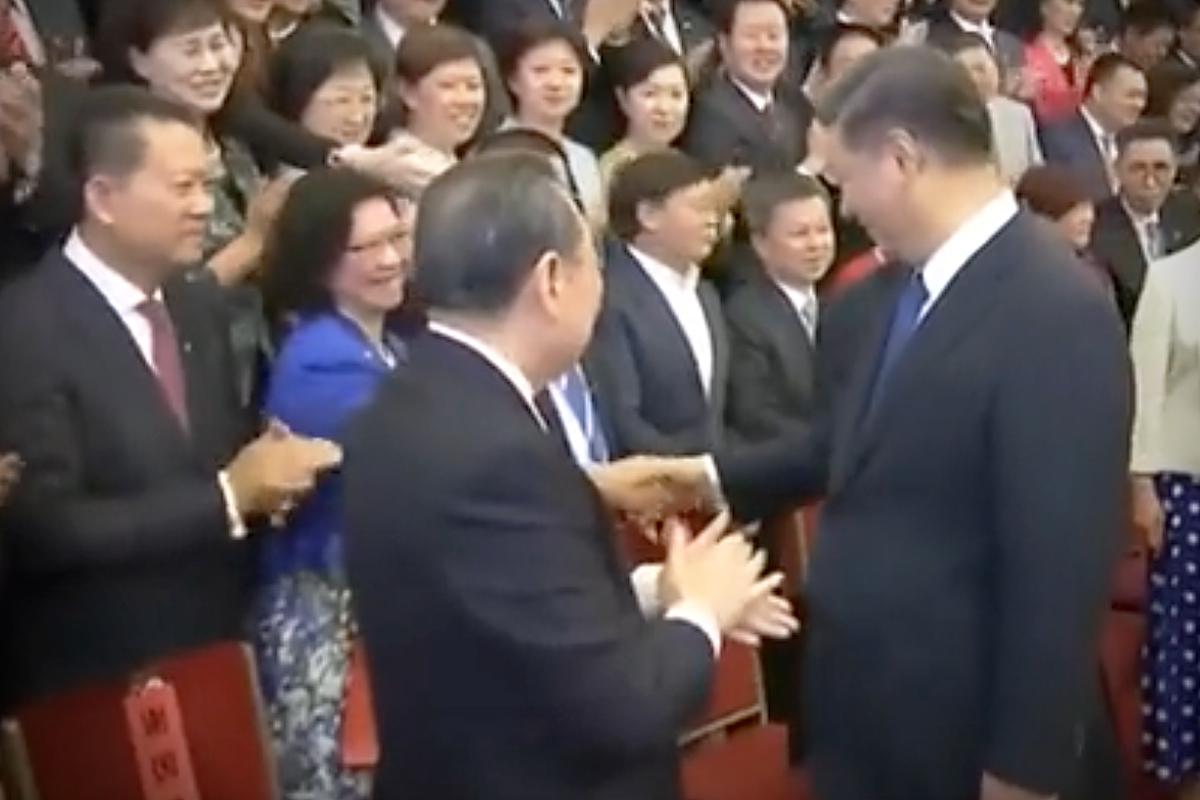
Christine Lee shook hands with Chinese leader Xi Jinping in 2019
Lee was open about acting as an ambassador for China-UK relations. "Raising the voices of overseas Chinese in China will not only benefit Chinese groups already rooted abroad, but will allow China to have its own international voice through the millions of overseas Chinese living and working abroad, while maintaining their close ties with China," she said at the Chinese People's Political Consultative Conference in 2009.
Lee also became an advocate for the historically low-key Chinese community to play a greater role in UK political life. The main vehicle was the British-Chinese Project, founded in 2006. It held events and organised trips to China. Among those who attended were a number of individuals who would go on to be candidates for parliament and local government. Her role in supporting candidates for office with Chinese backgrounds was far from secret.
A crucial conduit for Lee's influence was the Chinese in Britain All Party Parliamentary Group (APPG). Lee was "instrumental" in setting up the group, parliamentary director of security Alison Giles said in evidence for a recent Committee on Standards report on APPGs. Barry Gardiner chaired the group while Lee's British Chinese Project acted as its secretariat.
The MI5 alert specifically mentioned concerns that even though the Chinese in Britain APPG had been disbanded, there were plans to set up a new group. "APPGs are particularly attractive routes of access to parliamentarians," Alison Giles testified, arguing the ability of external groups to provide financial and secretarial support made them "what an intelligence officer would view as both an attractive and accessible target".
Christine Lee's contacts extended beyond parliament into the business community, the BBC has learnt. She helped facilitate a meeting between Chinese telecoms company Huawei and a political lobbying firm seeking its business in January 2019. One of those working for the lobbying firm was the former Conservative MP Neil Carmichael, who also worked with Lee on education issues.
But specific examples of Chinese interference remain hard to find. One state trying to influence another is normal - the issue arises when it happens covertly and if a state is considered hostile.
Some wonder if the Christine Lee alert was a useful way to make the case for measures in the new National Security bill, currently going through parliament. If passed, it will give security services new powers to go after interference - but some routes, such as political donations and APPGs, will remain primarily for parliament and parties to deal with themselves.
Martin Thorley points to China's desire to play a greater role in the UK's nuclear power programme as one of the key aspects of China's "longer game" in UK public life. Others say influence can be insidious - questions not asked about Hong Kong or Taiwan, as well as those that are.
But given Christine Lee had been active in UK politics for more than a decade and a half - and so visible - why did it take so long for MI5 and parliamentary authorities to act?
Security sources say the nature of her activity only became apparent over time. But they concede that changing government priorities is another reason. A public alert simply would not have happened during David Cameron and George Osborne's talk of a "golden era" of UK-China relations, a security official says, explaining the appetite was not there.
MI5 also needed to overcome its own caution.
For years, it was reluctant to go near politics - a legacy, partly, of pressure from the 1980s Conservative government to investigate left-wing groups - including trade unions. More recently, the parliamentary Intelligence and Security Committee would express astonishment that MI5 had not investigated Russian interference over the 2016 Brexit vote or the status of some political donors - another sign of its caution.
MI5 has shifted away from a focus on terrorism to state-threats in recent years - although Russia, not China, has loomed largest.
MI5's work against Chinese activity had doubled in the past three years - and would be doubled again - said Ken McCallum in his 6 July speech. But this, believes one former intelligence official, was starting from a low base.
There are also risks when politics and security collide.
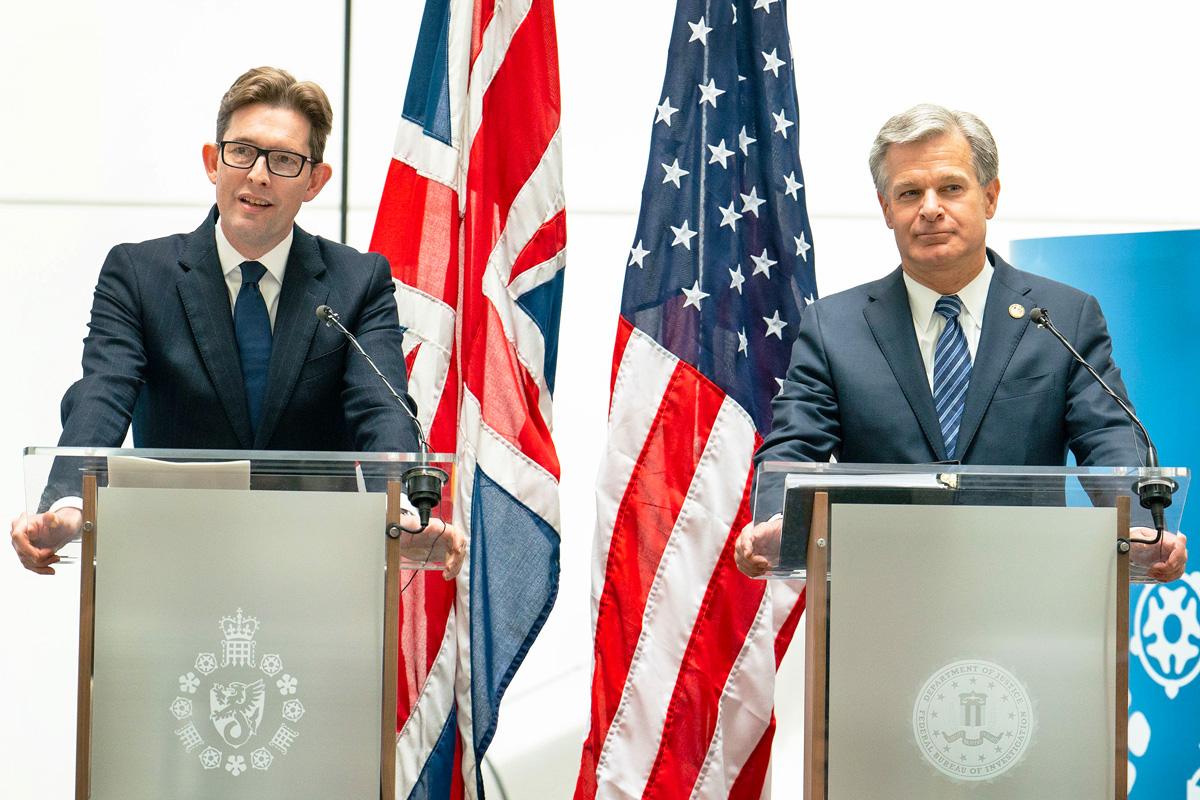
MI5's Ken McCallum (l) and the FBI's Christopher Wray at their joint news conference on 6 July
How much do political parties really want the security services poking around vetting donations and donors? Or doing background checks on candidates?
And, when elections come, there is the danger the intelligence will become politicised - as happened in Australia recently. The country's head of foreign intelligence offered an unusually public warning in February about an unnamed individual who was claimed to have "deep connections with a foreign government" and who had acted as a "puppeteer" to finance potential parliamentary candidates.
A businessman was subsequently named using privilege in the Australian parliament. He responded, describing the allegation as "baseless and reckless" - stating he had "never had any involvement or interest in interfering with the democratic election process in Australia".
Nevertheless, accusations of Chinese involvement flew as the general election neared, with claims that some of those standing had Beijing's backing.
The perceived targeting of specific communities can also create hostility and suspicion - a claim made by critics of the FBI's "China Initiative", which investigated academics' alleged links to China. In the UK, the Christine Lee alert has sparked talk of "witch-hunts" among some in the Chinese community - hampering efforts to become more engaged.
Whatever Christine Lee's own aims might have been, others may have been genuine in their desire to improve the participation of the Chinese community. "It is heart-breaking because there is no doubt that we need greater involvement," says Martin Thorley.
The Chinese embassy in London referred the BBC to a statement it issued in January saying: "China always adheres to the principle of non-interference in other countries' internal affairs. We have no need and never seek to 'buy influence' in any foreign parliament. We firmly oppose the trick of smearing and intimidation against the Chinese community in the UK."

More from Gordon Corera:

Related topics
- Published13 January 2022
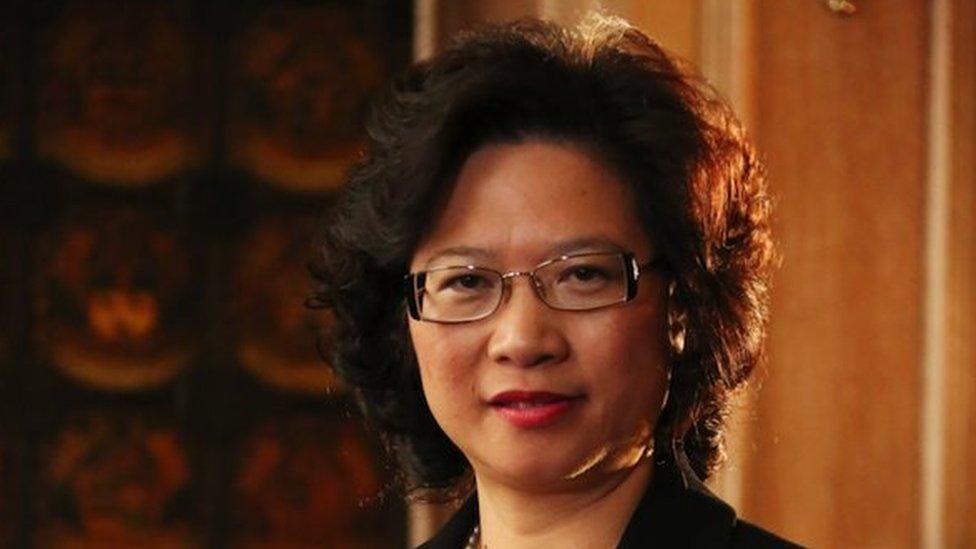
- Published14 January 2022

- Published26 March 2021
